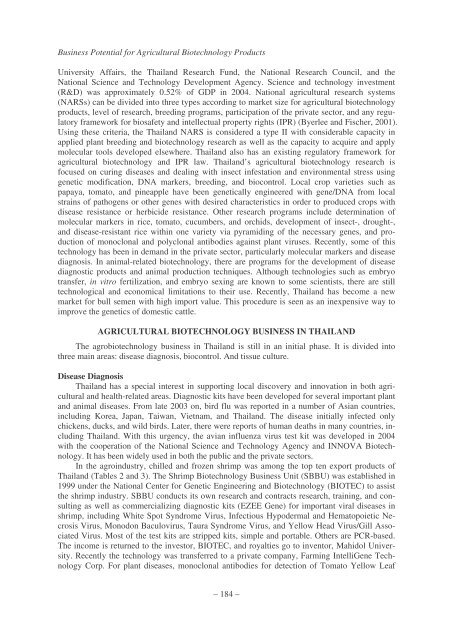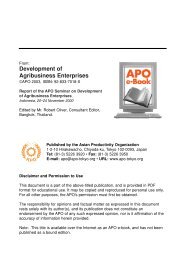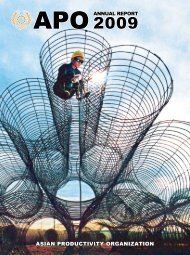Business Potential for Agricultural Biotechnology - Asian Productivity ...
Business Potential for Agricultural Biotechnology - Asian Productivity ...
Business Potential for Agricultural Biotechnology - Asian Productivity ...
You also want an ePaper? Increase the reach of your titles
YUMPU automatically turns print PDFs into web optimized ePapers that Google loves.
<strong>Business</strong> <strong>Potential</strong> <strong>for</strong> <strong>Agricultural</strong> <strong>Biotechnology</strong> Products<br />
University Affairs, the Thailand Research Fund, the National Research Council, and the<br />
National Science and Technology Development Agency. Science and technology investment<br />
(R&D) was approximately 0.52% of GDP in 2004. National agricultural research systems<br />
(NARSs) can be divided into three types according to market size <strong>for</strong> agricultural biotechnology<br />
products, level of research, breeding programs, participation of the private sector, and any regulatory<br />
framework <strong>for</strong> biosafety and intellectual property rights (IPR) (Byerlee and Fischer, 2001).<br />
Using these criteria, the Thailand NARS is considered a type II with considerable capacity in<br />
applied plant breeding and biotechnology research as well as the capacity to acquire and apply<br />
molecular tools developed elsewhere. Thailand also has an existing regulatory framework <strong>for</strong><br />
agricultural biotechnology and IPR law. Thailand’s agricultural biotechnology research is<br />
focused on curing diseases and dealing with insect infestation and environmental stress using<br />
genetic modification, DNA markers, breeding, and biocontrol. Local crop varieties such as<br />
papaya, tomato, and pineapple have been genetically engineered with gene/DNA from local<br />
strains of pathogens or other genes with desired characteristics in order to produced crops with<br />
disease resistance or herbicide resistance. Other research programs include determination of<br />
molecular markers in rice, tomato, cucumbers, and orchids, development of insect-, drought-,<br />
and disease-resistant rice within one variety via pyramiding of the necessary genes, and production<br />
of monoclonal and polyclonal antibodies against plant viruses. Recently, some of this<br />
technology has been in demand in the private sector, particularly molecular markers and disease<br />
diagnosis. In animal-related biotechnology, there are programs <strong>for</strong> the development of disease<br />
diagnostic products and animal production techniques. Although technologies such as embryo<br />
transfer, in vitro fertilization, and embryo sexing are known to some scientists, there are still<br />
technological and economical limitations to their use. Recently, Thailand has become a new<br />
market <strong>for</strong> bull semen with high import value. This procedure is seen as an inexpensive way to<br />
improve the genetics of domestic cattle.<br />
AGRICULTURAL BIOTECHNOLOGY BUSINESS IN THAILAND<br />
The agrobiotechnology business in Thailand is still in an initial phase. It is divided into<br />
three main areas: disease diagnosis, biocontrol. And tissue culture.<br />
Disease Diagnosis<br />
Thailand has a special interest in supporting local discovery and innovation in both agricultural<br />
and health-related areas. Diagnostic kits have been developed <strong>for</strong> several important plant<br />
and animal diseases. From late 2003 on, bird flu was reported in a number of <strong>Asian</strong> countries,<br />
including Korea, Japan, Taiwan, Vietnam, and Thailand. The disease initially infected only<br />
chickens, ducks, and wild birds. Later, there were reports of human deaths in many countries, including<br />
Thailand. With this urgency, the avian influenza virus test kit was developed in 2004<br />
with the cooperation of the National Science and Technology Agency and INNOVA <strong>Biotechnology</strong>.<br />
It has been widely used in both the public and the private sectors.<br />
In the agroindustry, chilled and frozen shrimp was among the top ten export products of<br />
Thailand (Tables 2 and 3). The Shrimp <strong>Biotechnology</strong> <strong>Business</strong> Unit (SBBU) was established in<br />
1999 under the National Center <strong>for</strong> Genetic Engineering and <strong>Biotechnology</strong> (BIOTEC) to assist<br />
the shrimp industry. SBBU conducts its own research and contracts research, training, and consulting<br />
as well as commercializing diagnostic kits (EZEE Gene) <strong>for</strong> important viral diseases in<br />
shrimp, including White Spot Syndrome Virus, Infectious Hypodermal and Hematopoietic Necrosis<br />
Virus, Monodon Baculovirus, Taura Syndrome Virus, and Yellow Head Virus/Gill Associated<br />
Virus. Most of the test kits are stripped kits, simple and portable. Others are PCR-based.<br />
The income is returned to the investor, BIOTEC, and royalties go to inventor, Mahidol University.<br />
Recently the technology was transferred to a private company, Farming IntelliGene Technology<br />
Corp. For plant diseases, monoclonal antibodies <strong>for</strong> detection of Tomato Yellow Leaf<br />
– 184 –
















